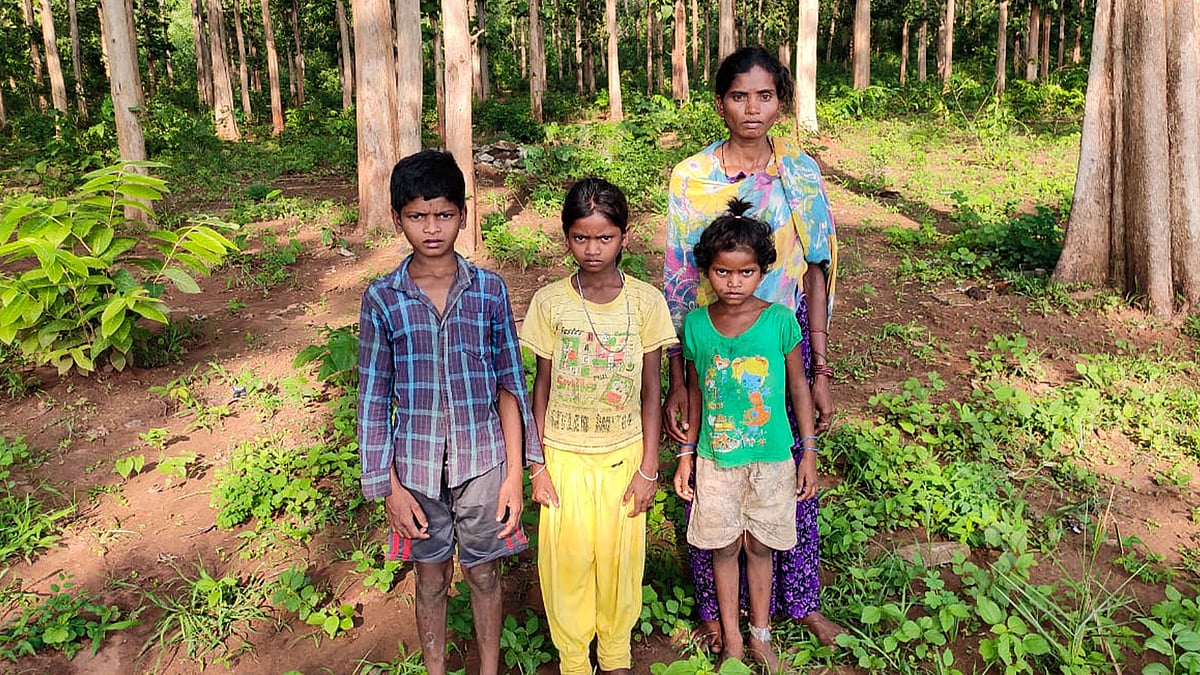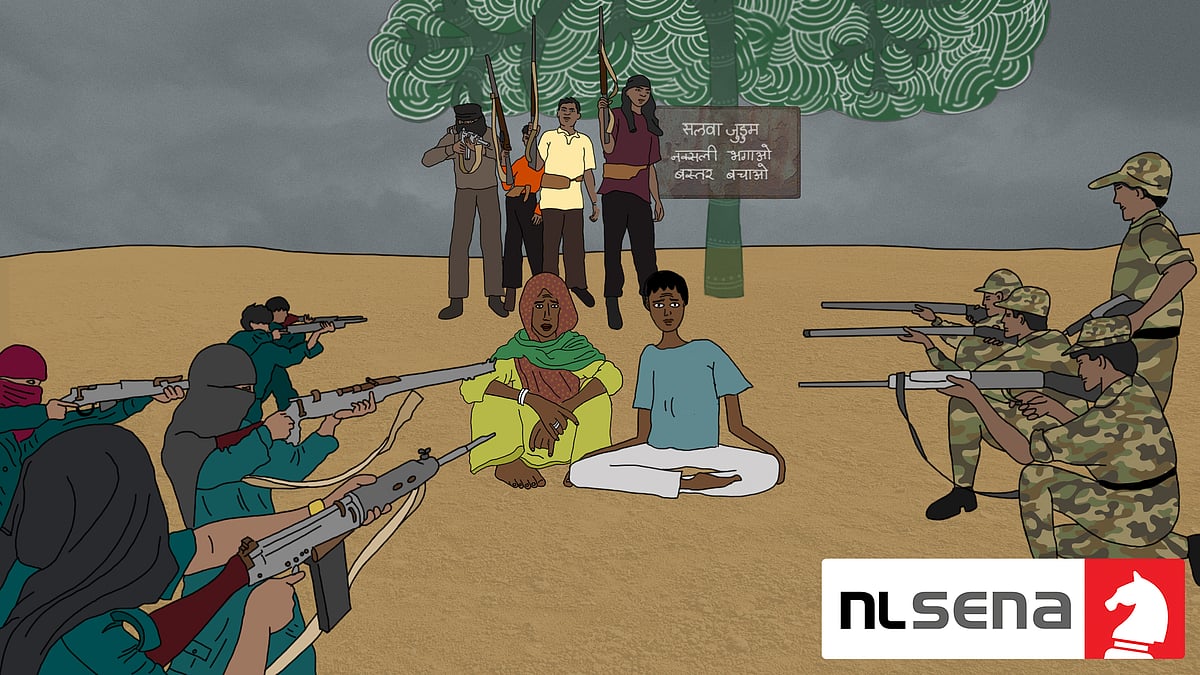False cases: How Chhattisgarh jailed 121 Adivasis for 5 years for a crime they didn’t commit
They lost loved ones and livelihoods during their incarceration. Now they’re trying to pick up the pieces.
It was 5.30 pm on July 16.
Two private buses were parked outside the sprawling pink building that houses the Jagdalpur Central Jail in Chhattisgarh. A group of men – 105 in total – emerged through the jail’s arched gates, each clutching a handful of belongings. They boarded the buses, the first step in their long journeys back home.
“I cannot explain the feeling I had,” one of the men, Lakshman, told Newslaundry later. “It felt like we had arrived in paradise.”
The men are among 121 Adivasis arrested in 2017 after suspected Maoists killed 25 CRPF personnel in Burkapal. They hail from the villages of Burkapal, Tadmetla, Karri Gundam, Metaguda, Permili, Tumalpada, Gondpalli and Tongguda, and were accused of aiding the Maoists. They were booked under the Unlawful Activities Prevention Act, the Arms Act, and the Explosive Substances Act, among other penal charges.
After spending five years in jail, all 121 were acquitted by a National Investigation Agency court in Dantewada. In its order on July 15, the court said “no evidence or statements recorded by the prosecution was able to establish that the accused were members of the Naxal wing” or “involved in any crime”. It also said “no arms or ammunition seized by the police were proved to be found from the accused”.
Of the 121 arrested, five were minors who were released two years ago, 105 were released from Jagdalpur Central Jail and three from Dantewada Jail on July 16. One Dodi Manglu from Gondpalli died in jail on October 2, 2021.
As Lakshman sat in one of the buses, homeward bound, he thought about his family and the ordeal they had gone through.
“I recalled how the police arrested me and forced me to sign a false statement,” he said. “We were innocent but they jailed us. It will always haunt me.”
Release after five years and 14 days
In 2020, Newslaundry visited ground zero of the Maoist insurgency in Chhattisgarh, where these villagers are from. This reporter spoke to at least 40 women whose family members had been jailed for the Burkapal attack. At the time, barely half a dozen of the accused had been brought before a judge during the three years of their imprisonment.
Lakshman said he was only produced before a judge twice: first in 2019 and then on July 1, 2022, a fortnight before his release.
Lakshman had been arrested and charged with “planning and executing” the attack. His purported statement to the police has him confessing to “joining the Naxal organisation in 2007” and “training for nine months” before taking up “sentry duties” for the Maoists.
Lakshman said the police wrote the statement themselves and forced him to sign it.
“The attack took place on the day of Beej Pandum, one of our biggest festivals,” he said, recalling the events of April 4, 2017. “We were all celebrating and drinking in a field outside the village. Most of us were not even in the village when the attack took place. The next day, the police took away one villager and killed him...Many of us fled after that in fear. I went to my brother-in-law’s house in Padwaras but a few days later, they arrested me from there.”
The murdered villager was Madkam Bhaman. Three years after his death, his mother had told Newslaundry, “My son was tall, strong, but his body was a heap of flesh. As if all his bones had been broken and the flesh piled up and wrapped in plastic.”
From his brother-in-law’s home, Lakshman was taken to Sukma Kotwali police station where he was interrogated. Though this arrest took place on April 28, 2017, police records accessed by Newslaundry incorrectly state the date as July 4.
Lakshman said he signed the false statement after the police “threatened to kill me”. He was imprisoned in the police station for a month and a half – during which he was “interrogated from 8 am to 4 pm daily” – and then released, only to be rearrested three days later.
Lakshman then spent 14 days in Sukma Jail before he was shifted to Jagdalpur Central Jail. “I was lodged there for five years and 14 days,” he said.
While in jail, Lakshman’s biggest concern was his family. His younger brother had been arrested on similar charges, while his father had been murdered by suspected Maoists in 2016 on suspicions of being a police informer.
“My mother, wife, sister-in-law and kids were alone at home. They had a hard time,” he said. “Five years of my life have been wasted in jail. Home, family – everything was devastated. I cannot complain about it to anybody. I hope to get my family’s life back on track now that I am free. It’s okay if we don’t get compensation but we really need jobs to revive our lives. The government should consider giving us a source of living.”
Arvind Chowdhary, a Jagdalpur-based lawyer who represented the arrested Adivasis in the case, told Newslaundry the police filed the chargesheet in October 2017. The hearing in the case began four years later, in August 2021.
“The most frustrating part was that the police did not produce 95 percent of the villagers for almost three years in court, despite filing the chargesheet,” he said. “The police officials themselves remained absent for the hearings. This delayed the trial and directly prolonged the time of these innocent people in jail.”
A court finally issued a warrant in 2020, Chowdhary said, after which the police began producing the accused in court in groups.
‘Fake case has destroyed my family’
False cases are a dime a dozen in these parts of Chhattisgarh. In Dantewada, Newslaundry has reported on how villagers live in perpetual fear of the police labelling them Maoists. In Bastar, Adivasis find themselves jailed for sharing a first name with suspected Maoists.
The Burkapal case was no different.
Newslaundry accessed some of the purported statements given by the accused to the police. They are all strikingly similar and follow this format: “I have worked for Naxalites for the last X years...I have hidden the explosives or bow and arrow or gun near a tree or hill in the jungle. Come with me and I will show you.”
Madkam Hunga, 40, who was released alongside Lakshman, told Newslaundry that he was first picked up by the police on April 24, 2017. Hunga’s story is tinged with a greater grief – his brother was Madkam Bhaman, the villager murdered by the police in 2017.
“The police came to my house in the wee hours. They took me and several other villagers to Burkapal camp and questioned us about the attack,” he said. “When I told them I had no knowledge about it, they tortured me. I was hung upside down and beaten. I still have those marks on my body.”
Hunga was released that evening. “On the same day, they picked up my brother and killed him.”
Hunga and some other men from the village fled, hoping to evade the police. “When security forces couldn’t find us, they asked the women left behind to reach out to their husbands and fathers and assure them the police will do no harm,” he said. “But it was a trap.”
Hunga and the others returned to the village and were arrested soon after on May 2, 2017. He was first taken to the CRPF camp in Burkapal. On the same day, he was taken to the Dornapal police station and then the Sukma police station. That evening, he was produced in a Dantewada court and imprisoned in Dantewada Jail. Five days later, he was moved to Sukma Jail, where he spent 20 days, before ending up at Jagdalpur Central Jail.
“During my entire jail time, I was produced in court twice,” Hunga said. “We would have been released earlier if the trial was faster.”
Hunga’s release, however, is bittersweet. “My wife remarried someone else last year and left my two daughters with my mother,” he told Newslaundry. “She could not cope with the situation. I didn’t expect this to happen.”
Hunga is grateful to be reunited with his mother and children, but said the “fake case has destroyed my family”. “My house is in shambles. I don’t even have money to repair it,” he said. “I avoid going to the jungle. I am afraid security forces may book us in some other fake case.”
Newslaundry had interviewed Hunga’s mother Aayte in 2020. At the time, she said, “I don’t have many days left now and I don’t know if I will be able to see my Hunga one last time.”
After Hunga’s release, she told Newslaundry on the phone, “I was ill and wondering if I will see my son one last time. By God’s grace he came back. We hugged each other and cried. I am happy my son is back. Now, even if I die, I will not regret it.”
Losing family ties in jail
Many of the men released have not seen their family members since their incarceration, because their relatives could not afford to visit them.
Sanna Madkam, 26, said he was one of the lucky ones to get visitors.
“My family had land. They sold a portion of it to bear the expenses of jail visits and lawyers’ fees,” he said. “But many families had nothing. It was not possible for them to see their loved ones in jail.”
Nuppu Mangu, 25, saw his mother for the last time in May 2017, just before he was arrested and sent to jail. His mother died seven months later.
“I came to know about her demise two months after it happened,” he said. He paused and added, “My mother protested a lot when the police forces took me away. She almost fought with them.”
Nuppu is happy to be home, though he laments the loss of five years through no fault of his. “We would have come out earlier if there had been more hearings in our case, instead of just two in the entire five-year period,” he said.
But not all the Adivasis arrested in connection with the Burkapal attack have been released. Sodi Linga, 35, was acquitted by the court but remains in jail after being charged in three other cases.
His wife, meanwhile, has left the village.
“She has remarried and left their two children behind,” Lakshman said. “The condition of those two children was terrible...But we cannot blame the wife as she struggled a lot. She finally gave up. They were the poorest of the poor in the village.”
There is also Dodi Manglu, the man who died in prison last year.
“Manglu was among 11 villagers from Gondpalli who were arrested in this case in 2017,” said lawyer Bichem Pondi, who represented the men in court. “The men went to Odisha to bring cattle. On the way back, they grazed the cattle at Nayapara in Sukma. The police arrested them from there and sent them directly to jail. If the police had investigated properly or produced these men in court properly, Manglu would be alive.”
 How Chhattisgarh police hunted an Adivasi farmer
How Chhattisgarh police hunted an Adivasi farmer Fear and longing in Bastar: For Adivasis in Salwa Judum camps, there is no way home
Fear and longing in Bastar: For Adivasis in Salwa Judum camps, there is no way homeNL Digest
A weekly guide to the best of our stories from our editors and reporters. Note: Skip if you're a subscriber. All subscribers get a weekly, subscriber-only newsletter by default.
